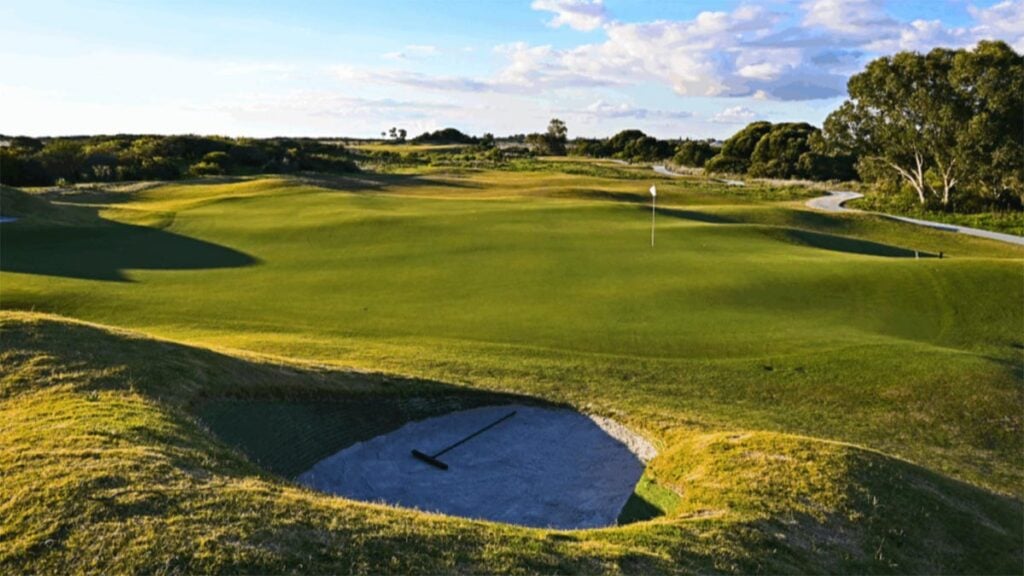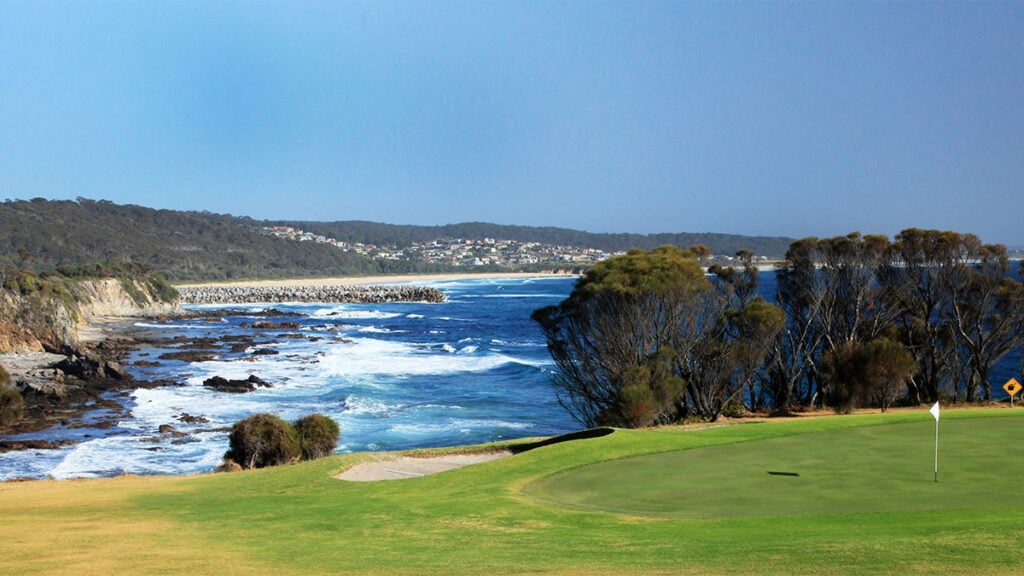Jack Nicklaus said what many were thinking after Rory McIlroy won the Masters: “It will take the world off his shoulders and you’re now going to see a lot more of really good golf out of Rory McIlroy,” Nicklaus said during the CBS broadcast. After 11 years of trying to complete the Grand Slam, McIlroy had finally done it. He would be unstoppable, right?
But that isn’t what has happened. The weeks and months after McIlroy’s Masters win have been uneven. In May, he finished T-47 at the PGA Championship, where it was leaked that his driver had been tested and deemed non-conforming. He didn’t speak to the press after any of the rounds at the PGA Championship. When he did talk after the third round of the U.S. Open in June, he wasn’t happy.
“I feel like I’ve earned the right to do whatever I want to do, yeah,” McIlroy said of skipping media.
At Oakmont, McIlroy slammed clubs and broke a tee marker. When he made the cut by a shot, he joked about his indifference to being there.
“It’s much easier being on the cut line when you don’t really care if you’re here for the weekend or not,” he said, chuckling.
After a final-round 67 to finish T-19, McIlroy again spoke to the media—this time, about motivation.
“If I can’t get motivated to get up for an Open Championship at home, then I don’t know what can motivate me,” McIlroy said of the final major of the year to be played at Royal Portrush in his native Northern Ireland in July. “As I said, I just need to get myself in the right frame of mind. I probably haven’t been there the last few weeks.”
“I climbed my Everest in April, and I think after you do something like that, you’ve got to make your way back down, and you’ve got to look for another mountain to climb,” McIlroy said. “An Open at Portrush is certainly one of those.”

Warren Little
MORE: Rory McIlroy’s weird PGA week ends with skipping media 4 straight days
McIlroy’s talk about a lack of motivation feels unexpected in part because of how different it is from the last player to complete the Grand Slam. After Tiger Woods won the Open Championship at St. Andrews in 2000 to complete the Grand Slam, he went on to win the next two majors.
Although Woods and McIlroy’s reactions and results after completing their Slams were very different, McIlroy’s isn’t completely unexpected, sports psychologist Dr. Deborah Graham, says. Dr. Graham has spent decades working with and studying professional golfers. She says what we’ve seen with McIlroy could be a bit of “post-success melancholy.” Maybe you’ve heard of it in reference to Olympians, and the lulls some athletes experience when the Games are over,
McIlroy’s completion of the Grand Slam was unlike Woods’ experience given where each were in their careers. Woods was just 24 years old, and achieved the goal relatively quicky. He didn’t have to spend 11 years listening to speculation. With McIlroy, meanwhile, it was a persistent focus, which carries even a risk even when successful.
“Some people call it post-success downer or post-success melancholy where you’ve had a single goal, a single purpose, and it’s not exactly single but it feels like it because that’s what everyone wants to talk about,” Dr. Graham says. “I can picture him having that as a very big target for quite some time. And like he said, when you reach a goal, you have to find something to replace it with, otherwise it leaves a void.”
By saying he needs another mountain to climb, McIlroy is addressing the fact that after the Masters, he didn’t have a plan. And he’s the type of player who appears to need to have a goal solidly in place to prepare and play his best.
The way to address this void, and find something new to replace it with, would be to take some time, Dr. Graham says. But the schedule didn’t allow for that. McIlroy played in two majors in the two months following the Masters. Taking all of this into account, McIlroy’s uncharacteristic comments and club slams start to make a bit more sense.
“We don’t even think about it, but when we reach a major goal, we kind of lose that sense of purpose,” Dr. Graham said.
When your goal is based on a result, there is an emptiness that can follow achieving that result. This highlights one of Woods’ superpowers. When he talks about golf, he emphasizes finding a reward in the work.
“The enjoyment is going out there and working for it, and grinding it out and going toe-to-toe with two of the best players in the world,” Woods said after the 2001 Masters. “David (Duval) and Phil (Mickelson), playing really well, to go toe-to-toe with them, that is work, but that’s what it’s all about. That’s the fun of it. And to have that challenge, whether you win or not, that’s why we play, to be able to experience that. That, to me, is the reason why I practice, to have that feeling, coming down the stretch knowing that you have to hit golf shots against the best players and somehow be able to do it.”
The power in this is that this work will always exist. No matter how many tournaments Woods wins, the work is always there. That’s why in the wake of winning his Slam, Woods was calm, collected, and ready to win the next two majors. It was all part of a process he enjoyed.
What McIlroy is going through is different. One response isn’t right and one isn’t wrong; McIlroy might just need some more time.
And luckily, now he’ll get it.
The week after Oakmont, McIlroy went to Connecticut to play in the Travelers Championship. He shot rounds of 64-71-68-65 and talked about feeling more confident with his driver. And said he’ll be going back to the United Kingdom and taking a couple weeks off before playing the Scottish and then the Open Championship.
“I think more so than anything else it will just be good for me mentally to take a little bit of a break and, yeah, as I said, get back to my neck of the woods, get back to the U.K. for a little bit, excited for that. I’ve alluded to the fact I probably haven’t taken enough time off or time to reflect after what happened in April, so I’m excited to do a little bit of that over these next two weeks,” McIlroy said after his final round in Connecticut.
What McIlroy is talking about wanting is exactly what Dr. Graham would prescribe.
“After you’ve had time to just enjoy it and do something completely different, get some balance back, then just take a little time and redefine your purpose,” Dr. Graham says. “What is my mission here? Some players have to even go back and say, Why am I competing? And then find that motivating goal. And then structure their life around that.”
Just because McIlroy has felt a bit unlike himself after completing the Slam doesn’t mean he’ll feel that way forever.

Harry How
RELATED: Rory McIlory’s post-Masters hangover seems familiar
Lydia Ko achieved a long-term goal of qualifying for the LPGA Hall of Fame, which is notorious for being one of the hardest to get into in sports. By winning gold at the Olympics in Paris, she earned her final point to qualify and was asked to compare what she went through with what McIlroy is experiencing.
“I thought my life or maybe the way I thought about myself would change when I got in the Hall of Fame and did a lot of the things I wanted to do before it actually happened, and I’m sure Rory is thinking the same in similar parts, where everybody was like, Oh, Masters is the one he was missing. Like, what if? And then he did it. And as much as I’m sure he’s so happy and relieved, he’s just as good the day before he won it,” Ko said. “I think that’s what I realized most, and that’s what made me realize I’ve still got to go out there and practice and put in the time to play well the week after.”
“We’re greedy in that sense, like nothing will fulfill us fully until we’re done,” Ko continued. “I think that’s the reason why we play. That’s why he’s at his level because of his competitiveness.”
There’s no right or wrong reaction to achieving a long-term goal. There’s just the reality of what certain personalities experience. McIlroy’s experience isn’t what was expected. He doesn’t look like a man who’s had the weight of the world lifted from his shoulders, ready to win any tournament he enters. Yet.
MORE: 5 extremely boring things tour players do that you can do, too
This article was originally published on golfdigest.com




